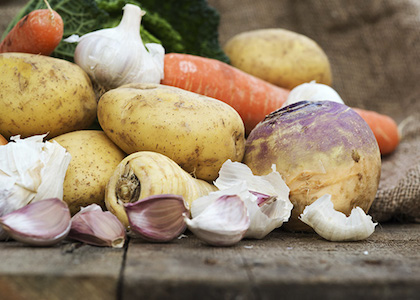
10 Winter Veggies to Eat Right Now
By Kristen DeAngelis
Eating locally in the cold winter months is easy with a variety of roots, tubers, and tasty veggies available. Local foods are fresher, taste better, have greater nutritional quality, reduce your carbon footprint, and support your community.
How to tell if your produce is local
- Read labels. Unless you are purchasing directly from the farmer, look for labels that state where produce is grown.
- Shop at farmers’ markets. Winter farmer’s markets are gaining in popularity. Just type in your location at LocalHarvest.com to find if your area features a winter market!
- Join a Community Supported Agriculture (CSA), where you buy a farm share and get weekly produce from the harvest. Use the same site above to find a CSA near you.
- Choose restaurants that source locally. Check your local food guide to find restaurants in your area that buy local.
- Learn what is in season.
Top 10 seasonal winter veggies:
1.) Beets (beetroots) are more than beautiful in color; they are high in potassium, magnesium, fiber, and vitamins A, B, and C, helping to cleanse the body. Use in this Red ‘New Beginnings’ Juice, roast with other root vegetables for a side dish, or top over a kale winter salad.
2.) Brussels sprouts are part of the cruciferous vegetable family offering a rich source of fiber, B Vitamins and calcium. Bring a sweeter side to your table with Pear Roasted Brussels Sprouts .
3.) Cauliflower is another member of the cruciferous veggie family and is packed with potassium, fiber, and vitamins C and B-complex. There are many colorful green and even purple varieties to choose from. Try this Meatless Monday Cauliflower Soup for a healthy dose of immune boosting nutrients.
4.) Onions, are part of the allium family and once crushed or cut, release important phyto-chemical compounds. Studies show allium helps decrease blood pressure and cholesterol and lowers blood sugar levels in diabetics.
5.) Sweet potatoes are one of the best sources of beta carotene and vitamin A among all root vegetables. This vital nutrient promotes healthy skin, hair, and vision. Check out a recent article on sweet vs. white potatoes to learn their benefits and more ways to use this seasonal favorite.
6.) Carrots are naturally sweet and crunchy and are a rich source of carotenes and vitamin A, and may help to protect skin, lung, and oral cavity cancers. Try colorful varieties you’re your next juice or serve alongside hummus for a healthy snack.
7.) Cabbage is an excellent source of vitamins C and K, helping to prevent infection and strengthen immunity. Use in stir fry’s, grated or chopped raw on salads, or pickled for homemade kimchi.
8.) Kale’s (Tuscan cabbage) potent antioxidants high vitamins K, A, C, and calcium content make this a superfood! Add to your morning Joe’s Mean Green Juice, or serve in a variety of soups, as a Winter Kale Salad or baked Kale Chips.
9.) Parsnips are sweeter than carrots and contain high amounts of fiber, vitamin C, and potassium. Use in a Spicy Winter Parsnip Soup or roast with other roots for a hearty side dish.
10.) Celeriac or celery root, is grown for its underground roots but tastes similar to upper part of celery stalks. Low in calories, and high in antioxidants, vitamins K and C, this popular winter veggie can be juiced or served in creamy soups or stews.
Don’t be afraid to get creative with the beautiful roots and tubers this time of year! What’s your favorite winter veggie?